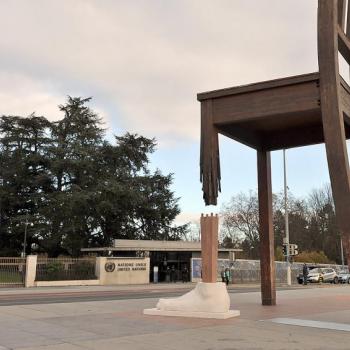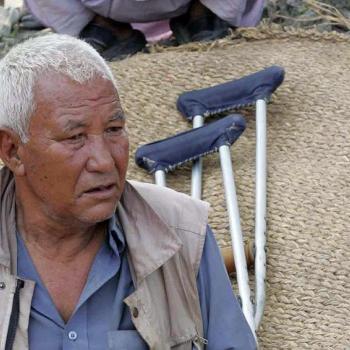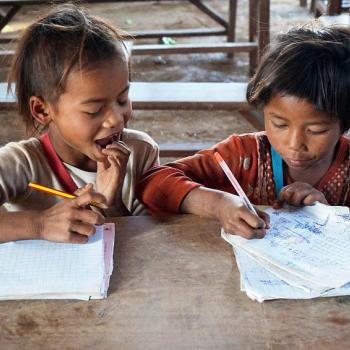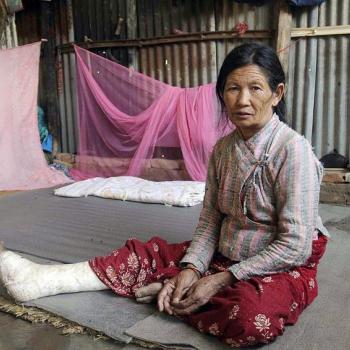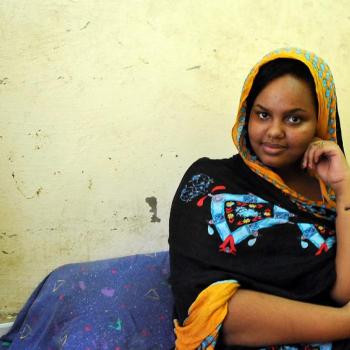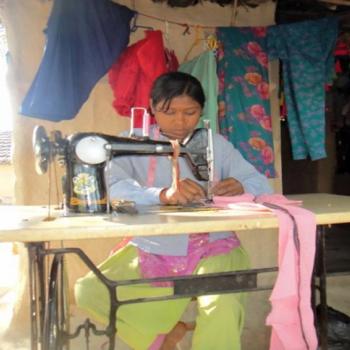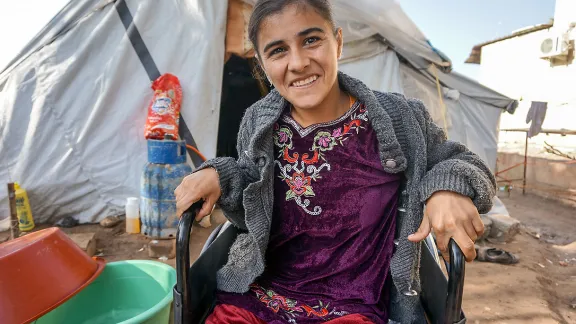
Nisreen Hajiâs face lit up when she was placed into a wheelchair given to her by the Lutheran World Federation and partners CAPNI and Al Ghazel in early December 2014. Photo: LWF/S. Cox
Highlighting conflict zones on International Day of People with Disabilities
(LWI) - The rough ground of a public park, which became a camp for people displaced by the ISIS advance, is an unlikely place to see a wheelchair. Especially as the new owner of the wheelchair lives in a tent with her family on a small, elevated piece of land.
Yet, Nisreen Haji, 22, was the perfect candidate for one.
Born with a mental disability, unable to walk or speak and with limited use of her hands, she cannot move without the help of family. When it came time for the Haji family to flee Sinjar from ISIS in early August last year, her father, Merza Haji, scooped her up and carried her on his back for 14 hours to the Syrian border, an effort that left him with a slipped disc in his lower back.
The family then got a ride on the back of a pick-up, arriving at the town of Khanke near Duhok city seven hours after setting off. Unable to get a place in the official camp, they had to settle for the park over the road.
As soon as Nisreen was placed into the wheelchair, her face lit up. Her warm smile said she was pleased. She clearly understood the freedom the wheelchair will afford her.
Nisreen is one of hundreds of people with disabilities the LWF supports in the worst of situations - conflict zones. December 3 marks International Day of People with Disabilities
The ground in front of the park is flat and compact, so she can be taken for short outings. From now on, she will be wheeled along one of the concrete paths to the toilet block, a facility shared with 24 other families, rather than carried.
The wheelchair was from the Lutheran World Federation, its partner CAPNI and from Al Ghazel, a local organisation supporting Yazidis with disabilities. Not only did it allow Nisreen some freedom, it lightened the burden for her family who have to carry her everywhere.
Back in Sinjar, Merza Haji drove a taxi. Now the family is both without an income and the prospect of earning one. “What can we do? We are only displaced people,” he says. “None of us can do anything.”
“She is my daughter and I am the person responsible for her”
In the park, tents are squeezed into the small space, a noisy diesel generator nearby belches smelly black smoke, and children with illnesses and birth defects are brought forward.
The Haji family tries to make the tent comfortable, despite it being too small for the nine of them. The floor is lined with cardboard cartons, two electric lights give some light, and the middle of the tent has been given over to a cooking area. Other than the World Food Programme, only the LWF and Al Ghazel had offered help, the family said. They were waiting to put their children into school but knew the waiting list was long.
Their eldest son is trying to defend what remains of the family’s homeland. He is still in the mountains of Sinjar, fighting ISIS with the Kurdistan army, the Peshmerga. “I believe God will help him survive,” Merza Haji said.
Nisreen’s mother Shereen Hassin says her eldest daughter likes to help with the cooking, particularly preparing potatoes, rice and chicken, when she can. She knows conditions for her family are far from ideal, least of all for a person with disabilities. “This is really a difficult situation for us but she is my daughter and I am the person responsible for her. We do our best.”
LWF supports displaced families in northern Iraq with food, sanitary items and other relief goods such as winter clothing. It also runs women-friendly spaces where women and children can engage in arts and crafts and receive psychosocial support.
With its local partners, the Jiyan Foundation and the Kirkuk Center for Torture Victims, LWF provides counselling and psychological support for traumatized people.
